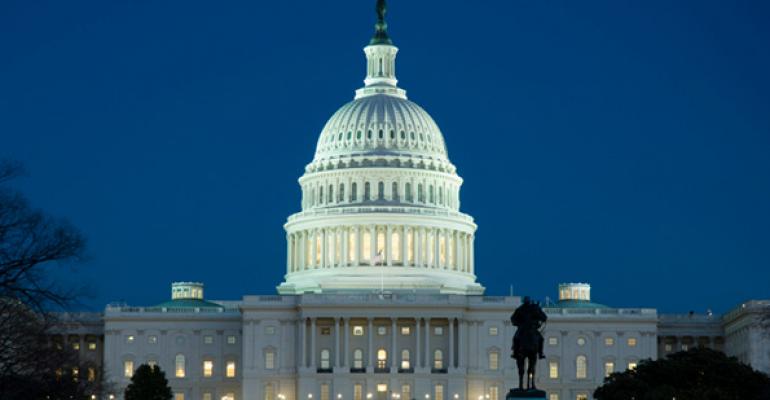The nation’s midterm election results last week shifted the U.S. Senate to Republican control and provided an opportunity for the restaurant industry to press for changes in the Affordable Care Act, minimum wage efforts and labor regulations, industry leaders said.
Industry executives are cautiously optimistic.
“The business community needs stability and clear policy direction to move forward,” said Herv Breault, a Pennsylvania-based franchisee of Philly Pretzel Factory, part of Soft Pretzel Franchise Systems Inc. “Hopefully this election will provide that clarity,” he said.
Dawn Sweeney, president and chief executive of the National Restaurant Association, said the restaurant industry is ready to seize the legislative opportunities afforded by the election results, which gave Republicans 52 seats and a majority in the Senate.
“We’ll see a more favorable climate for restaurant interests when the 114th Congress convenes on Jan. 3, 2015, but that doesn’t mean the path will be easy,” Sweeney said in statement to NRA members.
“The GOP will have a slight majority in the Senate,” Sweeney said, “but they will need to garner support from Democrats and Independents to pass any legislation that would otherwise fail to receive the 60 votes needed to overcome a filibuster.”
The NRA expects minimum-wage efforts to continue to shift to the state level, she said.
Voters in four states approved minimum hourly wage increases: Alaska from $7.75 per hour to $8.75 per hour in 2015 and $9.75 per hour in 2016; Arkansas to $8.50 an hour by 2017; Nebraska to $9 per hour by 2016; and South Dakota to $8.50 an hour by 2015. Illinois voters passed a non-binding measure for a minimum wage of $10 per hour by 2015.
President Barack Obama has called for raising the federal minimum wage to $10.10 an hour from the current $7.25 per hour, but Sweeney indicated “GOP control of the Senate makes it unlikely that Congress will pass extreme increases in the federal minimum wage. She added, “These increases won’t pass the 114th Congress, but that will only push the issue further to the states and localities.”
At the municipal level Tuesday, San Francisco passed an hourly minimum wage of $15 an hour by 2018, and Oakland, Calif., voted to raise the current $9 an hour wage to $12.25 in March.
In Massachusetts, voters approved a measure to require employers to offer 40 hours of earned paid sick time each year if they work for businesses with 11 or more employees. Businesses with 10 or fewer employees were exempted from the pay requirement, but they are required to allow workers to earn 40 hours of annual unpaid sick time.
Steve Caldeira, president and chief executive of the International Franchise Association, said the midterm election results indicated Americans “will not tolerate a government that blatantly continues to overreach through aggressive executive fiat.”
“As congressional leaders set their priorities for 2015,” Caldeira said, “franchise small business owners will work with Congress to pass legislation that would return the traditional, 40-hour work week definition of a full-time worker under Obamacare, while simultaneously reigning in the politically motivated overreach of the National Labor Relations Board.”
An NLRB administrative ruling earlier this year on joint-employer status for franchisors and franchisees has drawn industry criticism.
Tax reform, immigration on NRA’s agenda
(Continued from page 1)
Sweeney said the NRA also would be pressing the new Congress to change the Affordable Care Act’s definition of full-time employees from the current 30 hours a week to 40.
“The need to change the law’s definition of a full-time work-week remains a high priority,” she said. “We’ll work to establish a full-time definition that works for restaurants.”
Sweeney said the organization would also like to see greater scrutiny of the Internal Revenue Service as it “begins its controversial implementation of the Affordable Care Act and enforcement of the ACA’s employer and individual mandates.”
Other issues on the NRA policy agenda, she said, include immigration reform and tax reform.
“It’s possible that Congress and the White House will work to find common ground on issues of legalization, employment verification and border security,” Sweeney said.
In terms of tax reform, Sweeney said the NRA would work with the tax-writing committees in both houses “on the critical tax issues that the industry faces, while working to assess the opportunities for more structural reform,” Sweeney said.
Statewide elections also resulted in two state governors with restaurant-industry backgrounds.
Republican Doug Ducey, former chief executive of the Cold Stone Creamery chain, was elected governor of Arizona, joining Democrat John Hickenlooper, the founder of Denver-based Wynkoop Brewing Co., who was reelected governor of Colorado.
Joni Ernst, the Republican who won a close election in Iowa’s U.S. Senate race, cited her foodservice background in her Tuesday night acceptance speech. “It’s a long way from Red Oak to Washington, from the biscuit line at Hardee’s to the United States Senate,” Ernst said.
Contact Ron Ruggless at [email protected].
Follow him on Twitter: @RonRuggless





